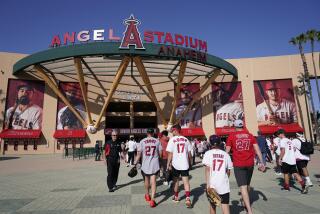U.S. Agrees to Sell Its Share of Card Club : Gaming: Proposal calls for government to receive almost $38 million for its interest in Bicycle Club. The business was seized in 1990.
After more than four troubled years in the casino business, the U.S. government has entered into an agreement to sell its controlling interest in the Bicycle Club Casino of Bell Gardens to a Santa Monica investment group for just under $38 million.
Federal officials confirmed Thursday that the newly formed investment group, Club Acquisition Partners, has been awarded an exclusive right to purchase the government’s 36.15% interest in California’s second-largest card casino.
The government seized the vast club along the Long Beach Freeway in April, 1990, after federal prosecutors proved that the casino was built in part with laundered drug money from Florida.
At the time, the Bicycle Club was the largest asset ever forfeited to the federal government under racketeering laws. The sale would mark the end of the government’s profitable, but embarrassing foray into the casino business.
Before the transaction can be concluded, the investors must be licensed by city and state authorities and the deal must receive the approval of a federal judge in Fort Lauderdale, Fla.
Members of two existing partnerships that together operate the club also will have a chance to make an offer for the government’s interest. The government owns a controlling interest in the larger of the two partnerships.
Because of the multiple approvals that are needed, a government source said the Justice Department will continue to be involved with the Bicycle Club for some time. “It could go on for as much as nine months,” the source said.
The source said the Santa Monica group’s offer was $37.96 million, or $1.05 million for each percentage point in the casino.
Carroll Spiller, deputy chief of the seized assets division of the U.S. Marshals Service in Washington, confirmed that the sales price was more than $1 million for each percentage point of the casino. A letter of intent to sell the government’s interest was signed last week, he said.
But Spiller and other federal officials declined to identify the individual investors in the limited partnership headed by Richard Schneider, a Santa Monica attorney. Schneider also declined to identify the investors.
Offers for the government’s share of the Bicycle Club were solicited by the U.S. Marshals Service and the federal trustee, Harry J. Richard, who oversees the casino’s operations on a day-to-day basis.
Numerous inquiries were received, but a source said fewer than a dozen offers were seriously considered at a meeting in Las Vegas two weeks ago.
Among those bidding for the government’s interest was Hollywood Park, which operates the Inglewood racetrack and contracts with a management firm to run a newly opened card casino there. Hollywood Park’s offer was rejected because California law prohibits publicly traded companies from owning a card club, the source said.
A proposal from the Bicycle Club’s employees to purchase the government’s share of the casino also was rejected.
Although the federal government has earned at least $25 million in profits from the club, in addition to the nearly $38 million expected from the sale, government officials expressed an eagerness to get out of the casino business when The Times in June disclosed their continuing role in the troubled club.
“There is a level of discomfort,” Chief Assistant U.S. Atty. Steven E. Zipperstein said at the time. “This is not the type of activity that law enforcement agencies are best suited to conduct.”
Zipperstein declined to comment Thursday on the sale agreement.
During the government’s involvement in the Bicycle Club, the Justice Department has found itself investigating alleged criminal activity in a business it partially owned.
Hollman Cheung, operator of the Bicycle Club’s lucrative Asian games, was indicted in January on loan sharking and extortion charges. His trial is scheduled to begin Wednesday in Los Angeles.
The government had to pay its share of hundreds of thousands of dollars in fines to the Internal Revenue Service for the casino’s violation of federal laws aimed at preventing money laundering.
And as a partner in the casino, the government participated in the club’s political contributions to defeat ballot measures that would have established competing card clubs, including one in the Orange County community of Cypress.
The government trustee also found himself at odds with the casino’s former general manager, George Hardie, over legislation that would have created a state gaming commission to tighten regulation of California card rooms. The measure died Wednesday in the final hours of this year’s legislative session.
The casino, with 2,000 employees and gross revenues of more than $90 million a year, is crucial to the financial health of Bell Gardens. The small city receives more than 60% of its income from taxes on the casino’s operations.
More to Read
Inside the business of entertainment
The Wide Shot brings you news, analysis and insights on everything from streaming wars to production — and what it all means for the future.
You may occasionally receive promotional content from the Los Angeles Times.










